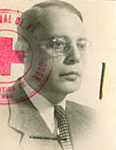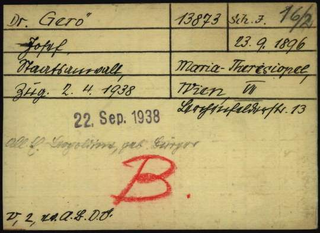Dr. Josef Gerö

Personalia
Born:
Died:
Profession:
Persecution:
Imprisonment 20.03.1938 - 02.04.1938,
Dachau concentration camp 02.04.1938 - 25.07.1939,
Released 1939,
Imprisonment 17.04.1941 - 18.06.1941,
Forced labor 22.07.1944 - 13.04.1945
Curriculum Vitae
Josef Gerö was born the legitimate son of a Jewish merchant and a Catholic housewife in Maria Theresiopel in Vojvodina in what was then Hungary [now Serbia]. In 1898, the family moved to Vienna, where Josef Gerö attended elementary school and then grammar school. He graduated in 1914, enlisted as a one-year volunteer in the First World War and was drafted into the artillery (field howitzer regiment) in 1915.
As a lieutenant with several war decorations, he disarmed at the end of November 1918 and enrolled in law at the University of Vienna. He obtained his doctorate in 1920, joined the judiciary, was accepted as a trainee judge in 1922 and passed the examination for trainee judges in 1923. He then became a judge and public prosecutor in Wiener Neustadt and Baden bei Wien. In 1929, he moved to the Vienna II public prosecutor's office. In 1934, Josef Gerö moved to the Ministry of Justice and became a political advisor to the Minister of Justice in 1936.
I can assure you that I only carried out my duties there in accordance with the laws that existed in Austria at the time, and did not allow myself to be influenced by either the right or the left in this regard.
In this function, Josef Gerö experienced the occupation of Austria when the German Wehrmacht marched into Austria on March 12, 1938. He was arrested by the Gestapo on March 20, 1938 and transferred to the Dachau concentration camp
As a "mongrel of the first degree", he cannot hope for a job in Germany, so he moves with his mother and daughter Margarete to join his brother in Agram/Zagreb. His wife Leopoldine stays in Vienna with their son Heinz, who is currently in the 8th grade at grammar school. After his graduation, his wife also moved to Agram/Zagreb in 1940.

Although his son Heinz was drafted into the Wehrmacht on October 2, 1941, Josef Gerö, his wife and his two children were informed on January 14, 1942 that they had been denaturalized and had to surrender their passports. They remained in Agram/Zagreb as stateless persons.
On 22 July 1944, Josef Gerö was arrested again and sent to Vienna for forced labor. There he witnessed the liberation of Austria in May 1945.
After the war, he became Austrian Minister of Justice in 1949 and 1952-1954 at the suggestion of the SPÖ. In the meantime, Gerö was President of the Vienna Higher Regional Court. As a victim of the Nazi regime, the SPÖ overlooked the fact that he had been involved in the persecution of revolutionary socialists and socialist insurgents as a public prosecutor from 1934 to 1938.
In addition, he became the first president of the revived ÖFB in 1945 and held this office until his death. He was also appointed the first Vice President of UEFA on June 22, 1954. He was also President of the ÖOC from 1946 to 1954.
Citations
Dokumentationsarchiv des österreichischen Widerstands (DÖW)
Universität Wien unter gedenkbuch.univie.ac.at/person/josef-geroe
Wikipedia unter de.wikipedia.org/wiki/Josef_Gerö
